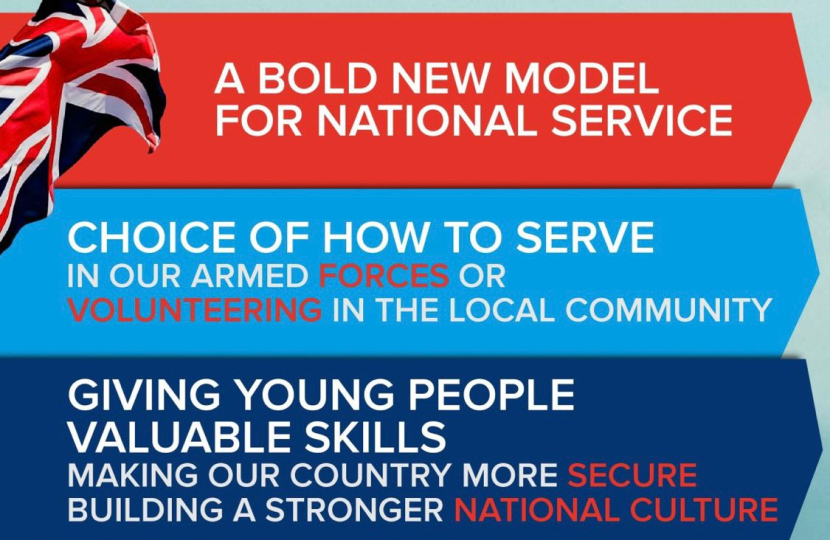
Not Conscription but a new modern National Service based on similar schemes in Sweden Norway Denmark and recently considered by Macron in France. This new nationwide programme for 18 year olds offers a world of new skills and experiences that will build individual opportunity and social mobility and social cohesion.
The New National Service is a key way of tackling isolation, social media dominance and identity politics by bringing young people together from all backgrounds and walks of life to share a sense of community and responsibility.
As a volunteer at Kingston Hospital and Prince's Trust and City Harvest London I know first hand how valued young people's engagement is and how well geared up these organisations are to accommodate training and management of new volunteers. I know how rewarding it is to volunteer and learn new skills and make a difference.
This programme has the backing of many big organisations like The Duke of Edinburgh's Award and will be an aspirational opportunity for young people.
Here's the full Briefing ...
Today the Prime Minister has set out that a future Conservative government will introduce mandatory National Service for every 18-year-old, to be spent in a competitive, full-time military commission or spending one weekend a month volunteering in their community.
· We have so much to be proud of as a country, but we also need to be open and honest about the long-term challenges that our country and our society faces. One of the challenges we want to tackle is that we have generations of young people who don’t have the opportunities they deserve.
· That is why we will introduce a bold new model of National Service for 18-year-olds to be spent either in a competitive, full-time military commission over 12 months or with one weekend per month volunteering roles in the community, like as a special constable, RNLI volunteer, or NHS responder. This will give young people real world skills, while contributing to their country and community.
· Uncertain times call for a clear plan and bold action to chart a course to a secure future. Our plan will ensure the youngest generations, and our country as whole, meet the challenges of an uncertain world. Keir Starmer and Labour don’t have a clear plan and won't take the bold action needed to navigate to a more secure future.
We have so much to be proud of in Britain, but we also need to be open and honest about the long-term challenges that our country and our society faces and one of the problems in our society is that we have generations of young people who don’t have the opportunities they deserve.
- The Covid pandemic showed the value of civic service to individuals and our country as a whole – while national service is a major change in the way our country works, it is completely essential. During Covid, millions of people contributed as NHS responders, vaccinators, and volunteers. Our vision of a more secure country is one where we rediscover that national spirit. Only by nurturing our shared culture and fostering a sense of duty can we preserve our nation and our values for decades to come. This is an investment in both the character of young people and our security.
- There are still too many young people without the life skills they deserve – volunteering can ensure young people don’t waste their best years out of work or in lives of crime. Research shows that volunteering and community service increases social responsibility and cuts criminality. National service will play an important role in making sure young people not in education, employment, or training, and young people who are disproportionately represented in the criminal justice system, especially for gang and knife crime, are diverted away from lives of unemployment and crime.
- Across Europe, other countries are taking steps to shore up their civic resilience and defence with models of national service. Sweden, Norway, and Denmark already have recently reintroduced modern forms of national service. President Macron in France has announced Service National Universal – a one-month residential placement for all 16-year-olds followed by 3 months part-time voluntary service – which will be mandatory when rolled out fully.
Our clear plan will introduce National Service for every 18-year-old. Young people will be able to CHOOSE between:
- Applying for a competitive, full-time military commission over 12 months in the armed forces or UK cyber defence, where young people will learn and take part in logistics, cyber security, procurement or civil response operations. This placement will be selective, so that our world leading armed forces recruit and train the brightest and best.
- Volunteering for one weekend per month (25 days per year) in a civic role, where they can choose between roles in our communities such as:
- Local infrastructure: supporting flood defences and communities during natural disasters
- NHS: collecting and delivering food; essential items; prescriptions and other support roles.
- Fire services: helping to organise and promote fire safety messaging; distributing fire safety advice
- British Red Cross: ambulance volunteer; wheelchair volunteer.
- RNLI: Water-safety volunteers; lifeguard; shore crew.
- Search and rescue: non-mountain based volunteering opportunities; foot patrols.
- Other voluntary roles to be considered by the Royal Commission we will establish.
We are doing this by:
- Setting up a Royal Commission to design national service, working with the military and civic society. The Commission will bring forward a proposal on how to make sure the first pilot is open for applications in September 2025, and we will introduce a new National Service Act to ensure that every 18-year-old will be required to do either military or civic national service by the end of the next Parliament.
- Reinventing national service will give young people valuable life skills, make our country more secure, and build a stronger national culture. Young people will receive best-in-class training in critical skill sets for the economy, from cyber to civil engineering to leadership. It will make our country more secure by diverting young people away from crime and unemployment, and training new generations to support their community and our security. And this will build a stronger national culture, where everyone shares a commitment to improving our country, and everyone shares in a sense of belonging.
International examples
- We have seen in recent years how, across the European continent, other countries have taken steps to shore up their national service models:
- In 2017, Sweden reintroduced a selective model, with 18-year-olds mandated to complete an electronic aptitude test and physical evaluation, with the highest ranked candidates called up for military service. Earlier this year, their government announced plans to create a new Civilian Defence Service, supporting first-responder agencies and the national grid (SDCAA, accessed 25 May 2024, link; The Times, 1 April 2024, link).
- President Macron has announced the intention to make Service National Universal mandatory - a one month residential one-month residential placement for all 16-year-olds focused on civic culture and cohesion, followed by 3 months part-time voluntary service (Politico, 17 January 2024, link).




